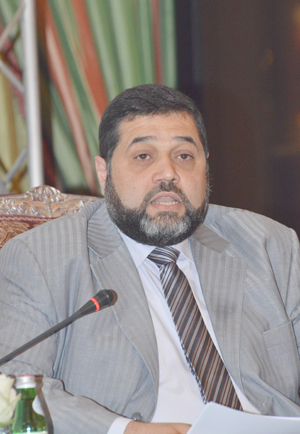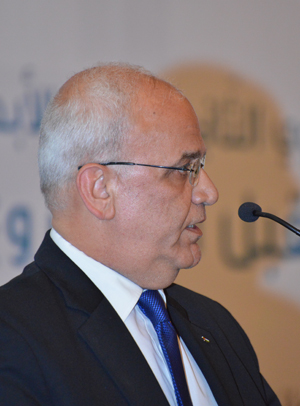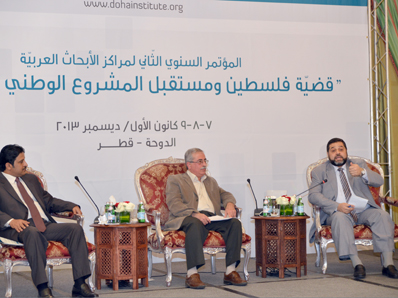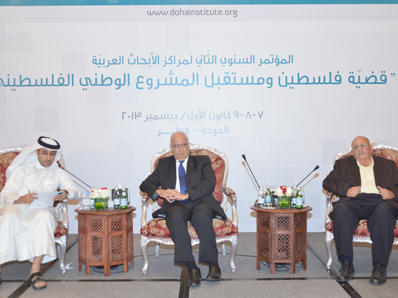
Hamas’s International Relations Head Osama Hamdan affirmed in a panel discussion preceding the Second Annual Conference of Arab Research Centers addressing “the Palestinian Cause and the Future of the Palestinian National Movement,” that resistance to the Israeli occupation is a matter of patriotic Palestinian action, and is not the restricted domain of any specific Palestinian grouping. “The decision to resist is a practical and realistic choice, and I believe its importance has increased with events in the region,” he stated. Saeb Erekat, PLO Central Committee member and chief Palestinian negotiator, emphasized that negotiations are strongly rooted in principle and law and give up none the legitimate demands of the Palestinian people. He affirmed that both courses of action, resistance and negotiation, share the single Palestinian goal of reviving Palestine as a geographical entity—a goal he claimed had never been closer to realization than it is today.
Resistance: patriotic Palestinian action not limited to any one faction
Osama Hamdan’s address, entitled “Resistance: The Options and the Future,” opened the ACRPS symposium on the eve of the Second Annual Conference of Arab Research Centers, currently taking place in Doha. He began by tracing the history of the Palestinian resistance from the time of the British Mandate until the most recent Israeli aggression upon the Gaza Strip. He concluded by stressing that resistance to the Israeli occupation is purely a matter of patriotic Palestinian action, and cannot be considered the restricted provenance of any specific Palestinian grouping; its importance has increased with the transformative events of the Arab Spring. He noted that the Palestinian resistance has never suffered from conceptual crisis, or from the lack of acceptance on the part of the Palestinian people, but it has suffered from internal and regional discord.
 |
| Osama Hamdan |
Accordingly, efforts to forge Palestinian unity must be finalized and brought to fruition, since no new step, whether of resistance or of negotiation, can succeed without being based upon Palestinian national unity.
Regarding resistance in the context of regional transformations, Hamdan noted that it is one of Arab peoples determined to change their oppressive realities and liberate themselves from tyranny, and that it has not yet played out, and that there are forces seeking to restrain their efforts and “return the genie to the bottle”. He observed that the most significant element of change might be seen in the transformation in the relationship between Iran and the United States with the conclusion, in principle, of the Iranian nuclear agreement. Iran has thus emerged as a regional power that retains the ability to act with regard to the region’s main issue, namely the Palestinian issue. This counters the views of those who suggest that it is only by conceding ground and abandoning positions supporting the Palestinian cause that countries can hope to gain power and influence regionally. He also stated that the resistance (Hamas) has engaged in two wars since 2008—one in the context of the Arab Spring and one prior to that—adding that any future attempt by Israel to advance into Gaza will result in it being ‘surprised’.
Following Hamdan’s address, Khalil Shaheen concurred that resistance forms part of the current Palestinian crisis, and questioned why Palestinian resistance has not been successful after decades of resistance. A large part of the answer, he suggested, lies in the very nature of the struggle, in which only an open-ended struggle can counter an open-ended Zionist project, the full extent of which no one can predict. As result, he felt there is a need to re-formulate the Palestinian nationhood project to include a strategy for changing the balance of power on the ground in the occupied territories, which is currently in Israel’s favor.
Palestine’s Recovery has Never been Closer
Saeb Erekat, the Symposium’s second speaker, spoke of “Negotiations: the Options and the Future,” noted that Palestinian unity must be the basis for a Palestinian strategy, and expressed optimism, stating: “We have never been closer to achieving our goal of recovering Palestine as a geographic entity than we are today, and this is a goal that all the Palestinian factions share, as we clearly do here today.”
 |
| صائب عريقات |
He confirmed that the Palestinian negotiations with the Israeli occupation are based upon four key points: Palestinian unity is the way to achieve the concrete realization of the state of Palestine; Arab support for the negotiations process, in the context of the regional democratic transformation, is the most effective way of supporting the Palestinian cause; the recent agreement concluded with the European Union to apply pressure to the Israeli counterpart in the negotiations; and, finally, the de facto expansion of American interests, and intensification of the American presence, in the region, which has driven home in American minds the understanding that there can be no stability or democracy without an end to the Israeli occupation.
Erekat recognized that the Palestinian Authority may have made a mistake in not having joined the 63 international organizations in voting at the UN General Assembly in favor of including Palestine as a non-voting member, a step which has now become urgently necessary, and indicated that the current priority in the negotiations was to strengthen Arab coordination and support, and to shore up European readiness to exert pressure upon Israel. He affirmed that the negotiations would make no concession on the rights of the Palestinian people, saying: “It makes no sense for there to be a Palestinian state without Gaza being part of it or Jerusalem being its capital, or without obliging Israel to shoulder its responsibility for addressing the rights of the refugees, according to the options for redress chosen by the refugees themselves.” He explained that Israel makes use of the settlements, the prisoners, and many other issues to barter against rights and force the Palestinians to make concessions and lower the bar for restoration of rights. This is something he vowed never give in to.
George Giacaman commented on Erekat’s address, and raised the critical point of the legitimacy of the Palestinian Authority’s continued existence if it is unsuccessful in transforming itself into a Palestinian state. The continuity of the Authority’s role as mega-municipality administering the lives of Palestinian civilians has caused it to lose its legitimacy in the eyes of the Palestinian public, which has brought some to demand the dissolution of the PA. Part of the PA’s role, he said, was to resist using diplomatic and legal avenues of resistance, including continuing on the path it had started to the United Nations and joining international bodies, with all the rights and privileges deriving from being a non-voting member of the body. Erekat replied by affirming that the Palestinian Authority had been born to transport the Palestinian people from occupation to independent statehood, and that it would, therefore, never respond to Netanyahu’s desire for an occupation without cost and for a Palestinian Authority without power.
 |
| symposium on: "Resistance: The Options and the Future" |
 |
| symposium on: "Negotiations: the Options and the Future" |